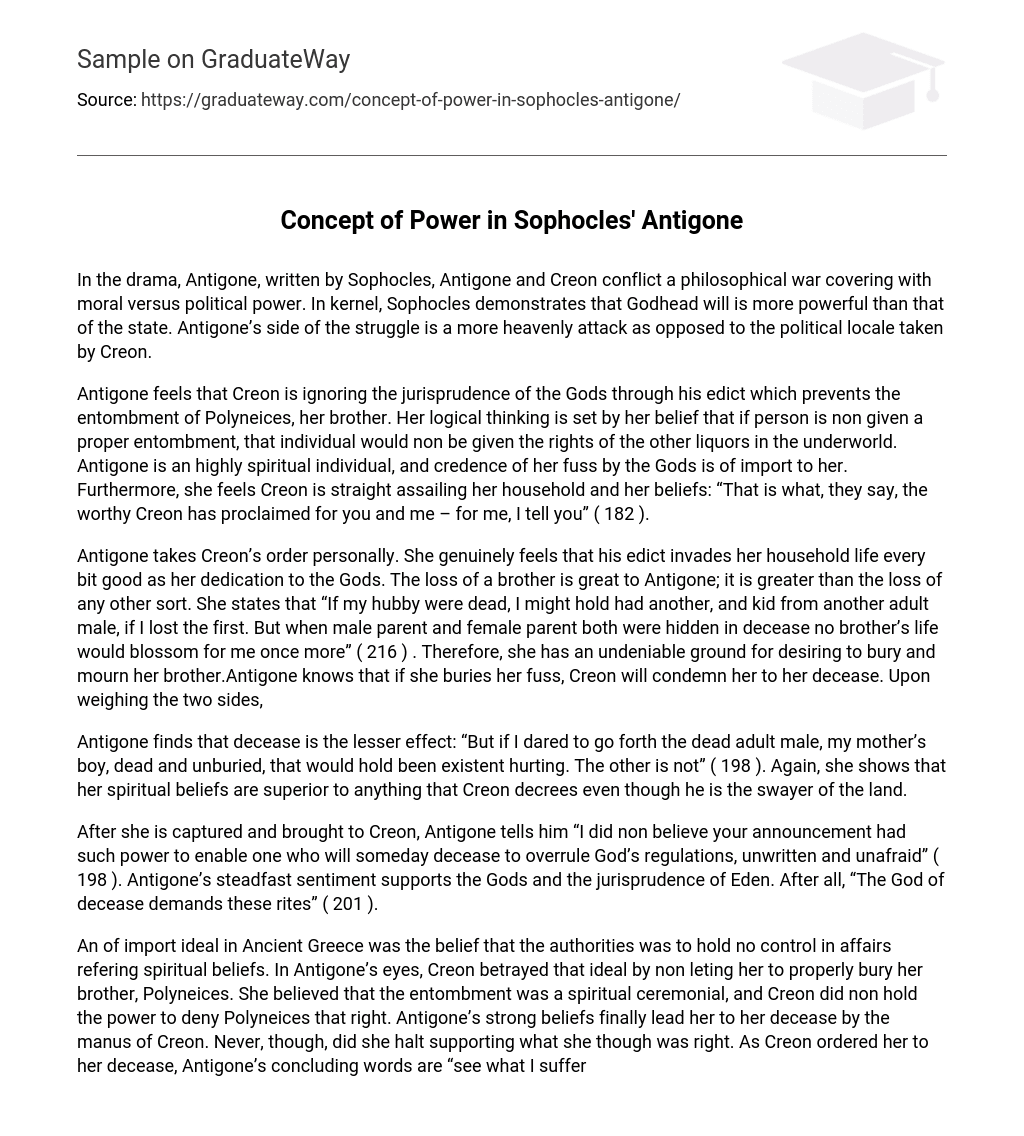In the drama, Antigone, written by Sophocles, Antigone and Creon conflict a philosophical war covering with moral versus political power. In kernel, Sophocles demonstrates that Godhead will is more powerful than that of the state. Antigone’s side of the struggle is a more heavenly attack as opposed to the political locale taken by Creon.
Antigone feels that Creon is ignoring the jurisprudence of the Gods through his edict which prevents the entombment of Polyneices, her brother. Her logical thinking is set by her belief that if person is non given a proper entombment, that individual would non be given the rights of the other liquors in the underworld. Antigone is an highly spiritual individual, and credence of her fuss by the Gods is of import to her. Furthermore, she feels Creon is straight assailing her household and her beliefs: “That is what, they say, the worthy Creon has proclaimed for you and me – for me, I tell you” ( 182 ).
Antigone takes Creon’s order personally. She genuinely feels that his edict invades her household life every bit good as her dedication to the Gods. The loss of a brother is great to Antigone; it is greater than the loss of any other sort. She states that “If my hubby were dead, I might hold had another, and kid from another adult male, if I lost the first. But when male parent and female parent both were hidden in decease no brother’s life would blossom for me once more” ( 216 ) . Therefore, she has an undeniable ground for desiring to bury and mourn her brother.Antigone knows that if she buries her fuss, Creon will condemn her to her decease. Upon weighing the two sides,
Antigone finds that decease is the lesser effect: “But if I dared to go forth the dead adult male, my mother’s boy, dead and unburied, that would hold been existent hurting. The other is not” ( 198 ). Again, she shows that her spiritual beliefs are superior to anything that Creon decrees even though he is the swayer of the land.
After she is captured and brought to Creon, Antigone tells him “I did non believe your announcement had such power to enable one who will someday decease to overrule God’s regulations, unwritten and unafraid” ( 198 ). Antigone’s steadfast sentiment supports the Gods and the jurisprudence of Eden. After all, “The God of decease demands these rites” ( 201 ).
An of import ideal in Ancient Greece was the belief that the authorities was to hold no control in affairs refering spiritual beliefs. In Antigone’s eyes, Creon betrayed that ideal by non leting her to properly bury her brother, Polyneices. She believed that the entombment was a spiritual ceremonial, and Creon did non hold the power to deny Polyneices that right. Antigone’s strong beliefs finally lead her to her decease by the manus of Creon. Never, though, did she halt supporting what she though was right. As Creon ordered her to her decease, Antigone’s concluding words are “see what I suffer and who makes me endure because I gave fear to what claims fear” ( 217 ).
Sophocles puts the concluding touches on his subject that Godhead will is more powerful than that of the province when he causes pestilence and sorrow to come upon the house of Creon. Creon is warned by Teiresias to allow Antigone travel and to bury Polyneices, but Creon is excessively late. His boy and his married woman kill themselves, and Creon is left entirely to recognize his mistake in thought that he had the power to disobey the Gods’ wants.





